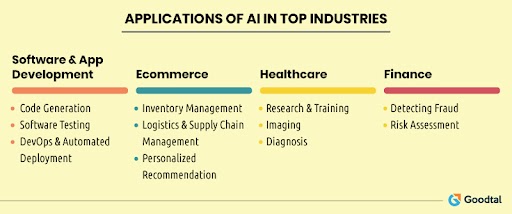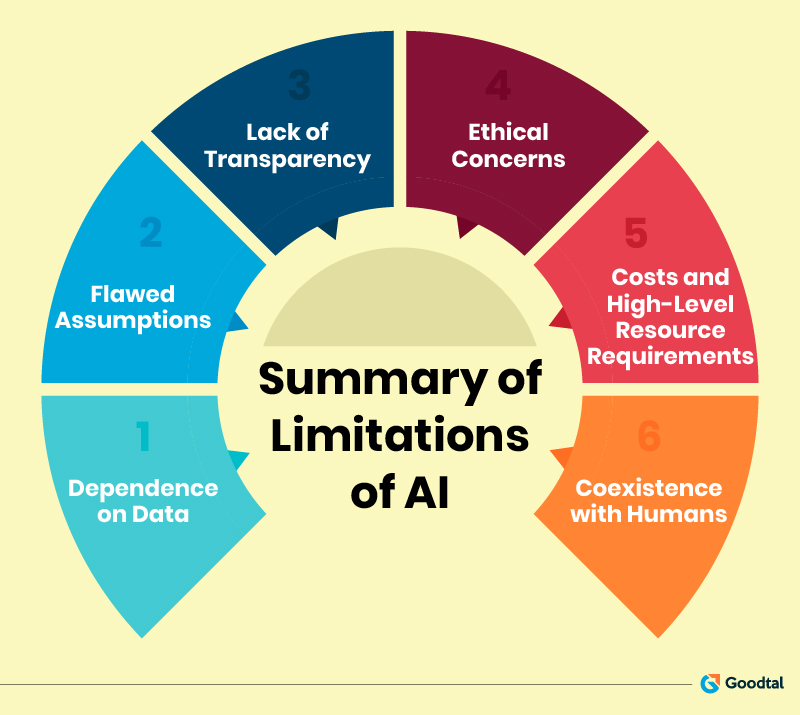
Who hasn’t heard about Artificial Intelligence? Be it users or businesses, everyone is talking about AI. To lure users, businesses from different sectors are exploring AI. Artificial Intelligence developers are thus in high demand.
According to these statistics published on Statista, the global AI software market is expected to reach around 126 billion USD by 2025.
After we have seen the level of employment of AI in global markets, it is also essential to know which industries are leveraging AI to their advantage.
Top Industries Leveraging AI
Various industries are leveraging AI and we can’t mention all of them here. So, here are some of the most prominent industries using AI to their advantage.
Software & App Development
Software and App development have traditionally been industries requiring human skills of a high grade. Let’s browse the core areas of software and mobile app development that are putting AI to best use.
Code Generation
The popularity of AI is growing among software development companies and app development companies for code generation now. Previously AI was solving the problems of their software and app users while now, it is assisting developers in their work.
Software Testing
AI is achieving new milestones in one of the most significant aspects of software and app development, i.e., bug detection and correction. AI can run through huge volumes of code in very less time. It can identify the bugs causing the code to break. It can further fill the gaps and correct erroneous code fragments.
AI helps in automating software testing and thus increases the efficiency of the process and reduces costs. Some of the best software testing companies are adopting AI as a part of the testing process.
DevOps and Automated Deployment
Deployment of applications is now very easy with AI. As applications are going global, it is necessary to streamline deployments, continuous integrations, and delivery using AI to maintain productivity in software development.
Ecommerce
As users worldwide are now using mobile phones and laptops for shopping, the ecommerce industry is rising like never before. Here are the different ways ecommerce is employing AI for success.
Inventory Management
AI helps study inventory data to assess its requirements based on market demand. It can help gauge the capacity of the warehouse needed during times of low and high demand. With such data, businesses can prepare for peak and low demand periods, including increasing or decreasing the inventory capacity temporarily, as and when required.
In the past, inventory management used to be a very costly and time-consuming process. Errors caused surplus resulting in wastage and heavy costs to the businesses. The technologically advanced countries then started experimenting with new techniques and methods. You must have heard of the Just-in-Time inventory management technique. For best results, AI can be employed to calculate this best time so that the system can raise alerts when the inventory is going below an optimum level.
Logistics & Supply Chain Management
As AI helps in predicting demand with changes in seasons or market needs, it can help optimize the supply chain to meet these changing demands without disrupting the system. AI can change a lot of things such as scheduling transportation and designing the best routes for carrying man and material.
AI further aids in making processes better, improving safety, and eventually reducing costs in supply chain management resulting in better ROI for businesses.
Personalized Recommendation
More than a decade ago, some users were apprehensive about online shopping as they found the personalized recommendation of products missing in this mode. As AI entered the ecommerce segment, businesses started studying user data, making their persona, and designing customized recommendations for them. This improved ecommerce user experience, and sales.
Personalized recommendations can also be used to suggest complementary or supplementary products. AI has a huge role to play in the personalization and customization of ecommerce experiences. The ecommerce businesses now cannot top the competition without AI.
Suggested Reading: How to Make a Successful Ecommerce App
Healthcare
AI has brought a turning point in the history of healthcare. The never imagined has been possible with AI in the last few years. Here is a summary of how AI is empowering healthcare.
Research & Training
Healthcare is a sector where training and development are not so easy due to cost and ethical constraints. So many processes or drugs cannot be tried on humans for obvious reasons. This is a hindrance to research and training.
However, AI has now made it easy for pattern detection and analysis. It can be used to predict results based on virtual samples. The results are obviously subject to further testing, but this helps eliminate the impractical hypotheses so that time is only used to take the research further with the most rational and lucrative options.
Imaging
Imaging is one area of healthcare that has suffered a lot due to human errors and differences in perceptions that are common with humans. AI can now be used to interpret the results of imaging very minutely so that the trouble areas can be pointed out. This data can be used by the specialist doctor who can now just focus on identifying the red flags out of all the pointers that have been listed.
Diagnosis
AI is an expert in pattern identification. It can scan through a lot of data in very less time, which is not possible for humans. This has led to major breakthroughs in the accurate diagnosis of rare diseases that are not even known to most experienced doctors.
Finance
Let’s have a quick look at the applications of AI in finance.
Detecting Fraud
AI can study and analyze data patterns very quickly. It can thus help in real-time analysis of financial transactions to detect anomalies or fraud. As the results are quick, fraud alerts can be used to stop or reverse the transaction. It can also help catch the person doing fraudulent transactions quickly and easily by doing real-time tracking.
Risk Assessment
The finance industry needs very robust risk assessment systems to evaluate the risks and suggest loan eligibility, investments, and insurance.
The list of applications of AI can go on. We can’t include everything here but we will focus on the core industries benefitting from AI. And, from the perspective of artificial intelligence developers, we must analyze which domains to prepare for and experience as these are offering lucrative AI development opportunities.
Summary of Applications of AI in Different Industries

Limitations of Artificial Intelligence
No matter how exciting or beneficial AI is, dealing with AI is not all lucrative unless you have a clear idea of its limitations and you can work accordingly.
Here are the common limitations that Artificial Intelligence development companies must always keep in mind and convey to their clients.
Dependence on Data
AI is largely dependent on data and patterns. It studies these patterns and draws interpretations and conclusions. At times the data it is using could be wrong. AI has no capability to correct this data and can instead spoil the results completely as it relies on this data.
Flawed Assumptions
AI is really good for certain tasks such as following procedures, optimizing processes, predicting scenarios based on data patterns, etc. However, it is not true that AI cannot go wrong in any of these. Believe it or not! AI shows deficient common sense which can lead to wrong assumptions and conclusions in unexpected situations for which the past data patterns are not available.
Lack of Transparency
AI will give you conclusions based on data and patterns very quickly. However, when it comes to understanding and researching how these conclusions are derived, AI will not help. Thus, AI-generated information cannot act as very good input for research purposes.
Ethical Concerns
AI is not accountable to anyone and this raises ethical concerns. So, AI should be used very sparingly and under strong human supervision, especially in sensitive situations. Let me emphasize, AI thus hasn’t replaced humans yet!
To mitigate this limitation, strong laws are being considered worldwide that would curb the use of AI or monitor it in certain situations. Regulatory practices can help developers focus on leveraging the technology better. Many movies have shown AI overpowering humans and the users thus have fear of what could happen if AI is all around them watching and taking hold of their lives.
It cannot completely be ignored by assuming that it is fiction, especially when we are aware of the capabilities of AI. Indiscriminate and unsupervised use of AI should be strictly avoided and regulations should be in place to prevent it.
Costs and High-Level Resource Requirements
Emerging trends in AI are attracting users to its applications and thus putting pressure on businesses to integrate it into their systems. However, AI development requires specialized technology, resources, and human resources skilled in these tools and technologies. So, integrating AI into business applications is costly and doesn’t fit the budget of many businesses.
We can though expect that the times and technology advancements will make AI integration so easy and accessible that most businesses will be able to leverage the capabilities of AI in the near future.
Coexistence with Humans
Though I am listing the challenges in the symbiosis of AI and humans as a limitation of AI, it is more of a human perspective. Humans fear that AI will take over the world, will cause mass job losses, and will overpower them.
Any new technology has made considerable changes to how we live. For example, the internet has become such an integral part of our lives now while 40 years ago, humans knew nothing about it and were living without it.
We need to accept that technology transforms culture and societies. It can make complete overhauls in lifestyle from one generation to the next. And it has also simplified mundane tasks and helped humans focus on larger areas of research in medicine, healthcare, education, manufacturing, and all other major industries. In the process, it will bring changes to many job roles, replacing humans in some, and adding some jobs that never existed. We need to embrace its benefits and work on removing the barriers and threats.
Summary of Limitations of AI

Wrapping Up!
After reading through this blog, you have the answer that the use of AI by businesses is not overhyped. If you are a business trying to beat the competition in this demanding market, you should not ignore AI. However, you will need this list of the top AI development service providers to find the right development partner for your needs.
